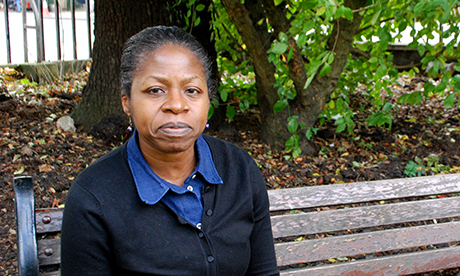Person and plate: star solicitor Diane Morrison picks up where Legal Aid left off
Diane Morrison’s a keen advocate of taking a packed lunch to work, but occasionally drops in to Dreyfus Café on Lower Clapton Road.
It’s conveniently close to the offices of Hackney Community Law Centre, where Morrison works as the best in-house solicitor in the UK – an accolade recently bestowed on her by the
Law Society.
“That’s what they say, yes,” Morrison acknowledges with a laugh as she joins the Hackney Citizen for tuna baguettes and orange juice. “I thought, I’m just going to get on with my work, award or not – other people have won awards.”
Hidden training
The Law Society gong didn’t specifically acknowledge the unbelievably gruelling apprenticeship Morrison underwent to get where she is today. Juggling part-time study and work for seven years, she managed to gain a law degree in 2003.
Morrison had given up hope of ever practising by the time she joined the Community Law Centre as a typist in 2005 – and actually concealed her degree subject in case her prospective employers suspected she was really after a training contract. She judged that “they would see my degree and think ‘oh no, she’s going to start hassling us.’”
Because staff were so thin on the ground, Morrison eventually began handling calls to the Law Centre in what would have had to have seemed a suspiciously expert fashion if anyone had had time to listen.
It was Matthew Howgate who finally twigged.
Brought in to the Law Centre with a remit to shut it down in 2009, Howgate, a Legal Aid expert, ended up making it viable again, allowing Morrison finally to take the Legal Practice Course and qualify as a solicitor in October 2012. The Law Society award – extraordinarily – marks only her second anniversary in practice.
Howgate’s success is rare. Comparable community law centres around the country have been shutting down because of cuts to Legal Aid and Morrison is worried for the future. “You have judges now who are saying to applicants ‘you need to get legal advice so I’m adjourning the case’ – it’s not working.”
Is social welfare law glamorous? Morrison points at her shoes. “These are six quid in Primark. It’s not at all glamorous: we have solicitors at the Law Centre with 20 years’ experience who are just about on £35,000 a year” – a company lawyer with equivalent experience could expect to be earning comfortably over three times that amount.
It’s long hours in the Law Centre, with Morrison working well beyond what she’s obliged to do.
“Last night I left after 10 o’clock. It depends on what’s going on. For me it’s usual but it’s not our set hours, which are 10am to 5.30 in the evening.”
Survival mode
Even the Law Centre needs to be business-minded, taking on cases which can be paid for out of Legal Aid.
“You have to earn money because without money you won’t survive,” as Morrison puts it. Nevertheless, the Centre accepts clients from all over London, unlike similar centres in other areas which usually have a residency requirement. Morrison’s even handled calls from Sweden and Thailand – admittedly from Hackney residents who “somehow happened to be there”.
Legal Aid for Morrison’s own areas of expertise – debt and employment law – has been cut entirely, and her work at the Law Centre is dependent on charitable funding, principally from the social welfare charity Trust for London.
She says vulnerable groups such as immigrants and disabled people are being most affected by the cuts, with doctors’ surgeries, even, picking up some of the work as patients report on their circumstances.
“GPs now are getting frustrated, saying ‘this person needs this advice’, and you have Social Action for Health, or Mind, having to take on that additional burden.”
Changes to the way employment tribunals are funded – including the introduction of a charge for employees to bring a tribunal for unfair dismissal – are weighting the system against employees, in Morrison’s view.
Hand in hand with this is the way advice is now divided up into distinct areas, handled by people who aren’t legal professionals able to deal with the whole person.
“If you have a benefit problem, that’s going to affect your housing situation and that could lead to a debt problem. We have people who can work on the benefit problem but they can’t do anything about the
other problems.”
For Morrison, it was because of the financial downturn that cuts had to be made, but which groups were affected was decided by political imperatives. She doesn’t see problems being solved even as the economy recovers, pointing out that “even when the economy was great, immigration law was one of those areas that no one wanted to focus on.”
Morrison was born in east London, in Forest Gate, Newham, to Trinidadian parents. But in the early seventies the family moved back to the West Indies, where she spent her teenage years, returning to London in 1991.
She ascribes her desire to do the work she does to growing up in her somewhat isolated family in Trinidad, with a father not overly concerned with his children’s education.
“We were always sort of left to ourselves: whenever you needed to get something done you didn’t know who to go to, where to go to or what to do – when I was in sixth-form I started to think ‘I don’t want to be in the same position where things are going to be really hard’.
“Now when I’m talking over the phone to someone and they say ‘I didn’t know that, I wish someone had told me before’ – that’s what I’m doing this for, you know?”
Hackney Community Law Centre provides free, independent legal advice.
hclc.org.uk / 020 8985 5236

